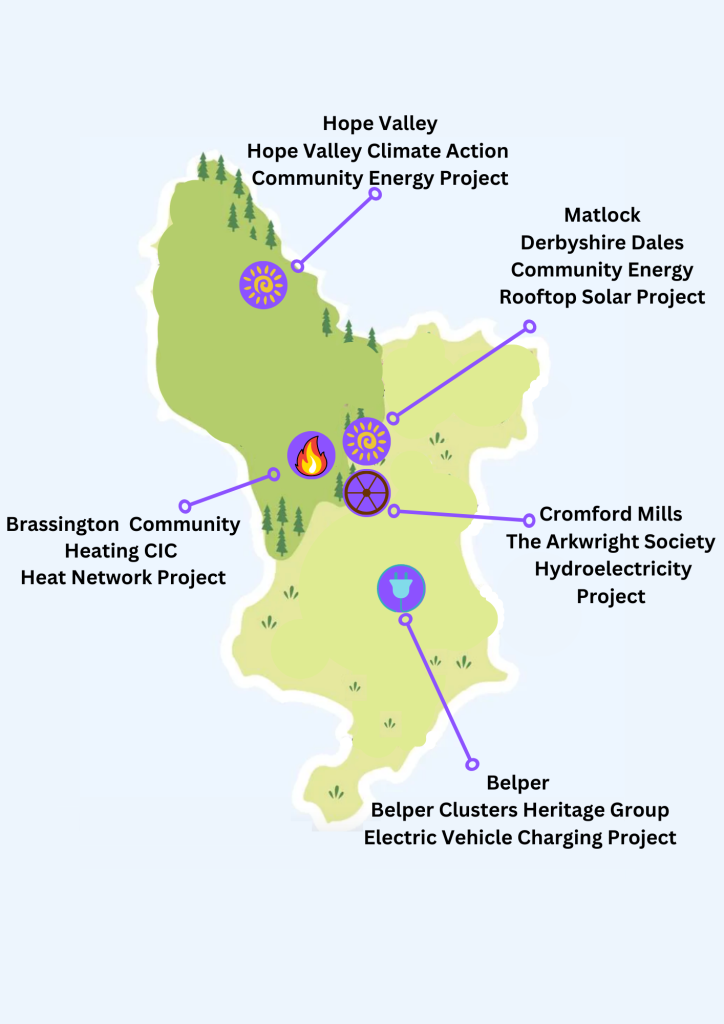
There is a growing appetite for the development of community energy programmes across the UK. Currently over 400 proactive programmes exist in the UK according to Community Energy England’s State of the Sector report, which have generated over £3 million of community benefits.
In Derbyshire there are currently five second stage 1 Rural Community Energy Funded (RCEF) programmes, which have been supported by the Midlands Net Zero Hub. These include the Derbyshire Dales Community Energy programme in Matlock and the Derbyshire Dales, Arkwright Society programme at Cromford Mill, Hope Valley Community Energy, Solar electric vehicle (EV) charging in Belper, and a Heat network programme in Brassington. There are
at least two others being considered – a Hydro scheme in Darley Abbey and another similar scheme in Belper.

Just like the pioneering Georgian engineers such as Arkwright and Smedley – who used the abundant rivers and streams to power the industrial revolution in the Derwent Valley – these renewable energy democracy pioneers are now seeking ways to ramp up the application of solar energy in our schools and businesses.
1 Second Stage Programmes move from feasibility studies to the stage of implementation of solar panels on buildings – both community owned and commercial -who agree to being involved. Derbyshire has more RCEF programmes than any other County in England.
New investment partner energises and enhances plans for Derbyshire Dales community energy scheme. Plans for a social renewable energy scheme in Matlock have been supercharged by a new partner organisation which has identified potential to harness up to 1 million Watts of solar electricity from sites in the district. Derbyshire Dales Community Energy Ltd (DDCE) has enlisted the support of Shropshire cooperative Sharenergy to help guide the process, drawing on its experience of raising more than £20 million through community share offers linked to similar initiatives all over the UK.
The first two Matlock rooftop sites, Highfields School and Twiggs on Bakewell Road, have already passed feasibility assessments to install solar panels. These solar arrays will have an approximate capacity of 220 kilowatts, equivalent to the energy needed to power around 25 average households. But Sharenergy says there is scope to go far beyond that.
DDCE spokesperson and Chair of its board of directors, Dr Steve Martin, said: “Sharenergy has identified an ambitious opportunity for us to ensure the longevity and stability of the group. The plan is to take community energy in Derbyshire to the next level by installing 1MW worth of solar photovoltaics (solar PV) in up to nine or 10 different locations ( see first stage portfolio sites below).
“The project partners plan to install the first two solar arrays on top of buildings in Matlock in 2023. This will not only be providing a significant amount of renewable energy, but it will also make DDCE more resilient to the potential risks associated with small scale solar PV. We also believe this will help safeguard the future energy security of our schools and other community buildings as well as key businesses in Derbyshire.”
Dr Martin also added: “There are a growing number of other sites in the pipeline that could potentially work well, but they need further analysis and commitment from their owners and trustees. One of the main factors is that a good solar site doesn’t only need roof space for the PV installation. For a community project to be financially viable, it’s important that a large portion of the energy generated by the solar is also consumed on site.”
Derbyshire Dales Community Energy Ltd has gone out to tender to several local
and regional solar installers for the following sites:
Twigg Stores
Highfields School Lower
Highfields School Upper
Hurst Farm Social Club
John Palin Fresh Produce
Peak Converters
Milner Off-Road
Once the installation tenders are received, it will then be possible to move quickly forward on negotiating with each of these sites to establish some price options along with setting out the legal agreements for leasing their roof space. This will allow the programme to move forward on initiating a share offer both regionally and nationally. If all goes according to plan, DDCE expects to release shares this autumn, funding the first two installations in early 2023.
DDCE volunteers have also been busy working to set up a community energy hub which will link all the existing, and potential new, projects around Derbyshire, so they can coordinate resources and mutual support. The team is celebrating news that Derbyshire County Council have granted Derbyshire Dales Community Energy Ltd £50,000 to fund a Community Hub Coordinator to support the existing five Rural Community Funded Stage 2 programmes in Derbyshire and other community energy developments in Derbyshire. The aim is to widen the uptake of community energy activities across the county to realise the net zero carbon targets of county and district councils, in addition to acting as a catalyst to encourage wider community action and tangible engagement.
For more details, contact derbyshiredalescommunityenergy@gmail.com.